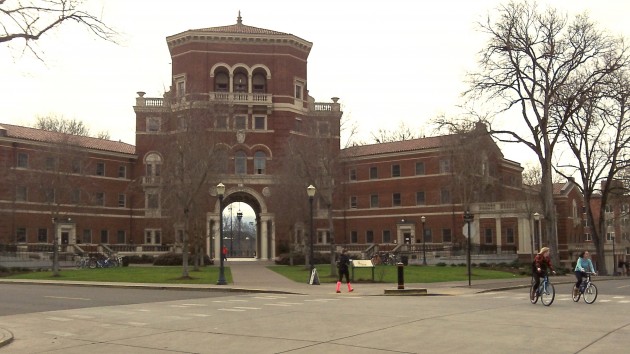It’s time to repeal or just ignore Oregon’s so-called 40-40-20 goal, which isn’t doing anything for anybody except the higher education establishment. But the president of Oregon State, among others, thinks it’s still a great idea.
In one of its occasional utopian flights of fancy, the legislature in 2011 adopted the 40-40-20 concept as a law. It says that by 2025, 40 percent of adults should have bachelor’s or advanced degrees, another 40 percent should have at least an associate degree or post-secondary credential, and all the rest should have at least a high school diploma or equivalent.
This sounds OK as a vision or a goal. But since the state does not have the means to carry it out, it was stupid to pass it as a law. And now it is also beginning to look misguided as a goal.
Higher education now costs huge amounts of money, enriches the top ranks of people it employs, throws students and their families deep into debt, and often does not pay off in terms of economic advantage either for new graduates or society as a whole. There simply are not enough jobs where a college degree is necessary or even helpful.
But the drive to churn out more graduates continues. President Ed Ray of Oregon State, when he announced on Jan. 30 that OSU had surpassed $1 billion in donations since 2006, said the university plans to keep growing. It plans to reach an enrollment of 28,000 students in Corvallis, 2,000 more than now; increase its campus in Bend so it enrolls up to 5,000 by 2025; enroll another 7,000 students online, and establish a marine studies campus in Newport for 500 more. (Is there some shortage of marine scientists, a shortage that is holding back Oregon’s economy?)
Citing 40-40-20, Ray called on the legislature to increase college funding, which it can’t do because the state doesn’t have the money. (It will have even less when the vast expansion of Medicaid under Obamacare starts taking bigger bites out of the general fund.)
Oregon would be far better off with a more aggressive emphasis on vocational education. The idea would be to prepare more young people for jobs that actually exist and can’t be exported. Under such an approach, the state colleges would not have to grow as fast or as big. They would not need billion-dollar fund-raising campaigns and they might cost less for those who want to prepare for careers where degrees are a must. And fewer people would enter the working world burdened by tons of oppressive debt. (hh)


Hasso – thank you for your thougths on this. To some extent I believe that the “college education” has been one of the biggest frauds perpetrated on America. Certainly, there is great value in education, but there needs to be an examination of the change in what a college education means today as opposed to what it meant even 30 years ago.
The goals should be:
Primary Education – teaches fundamentals and how to learn
College Education – teaches how to think and apply knowledge
Graduate Education – teaches you to contribute to the pool of knowlege in the world
Primary education is the public responsibility. Higher education used to be the individual’s responsibility but is rapidly becoming the public’s responsibility as well. With the vast array of government subsidies is it no wonder that the cost of higher education has increased at a rate beyond inflation over the last 30 years? Removing market forces and applying government subsidies only ever results in price increases and less effecient use of resources. When I paid off my student loans in 1981, my total for 4 years in a state college (tuition, books, expenses) – was $7500. I pay more than that for one semester’s tuition for my daughter today. Young adults are graduating from college with 10s of thousands of dollars in debt. All because a college degree will give them a greater opportunity (College graduates make more money than high school graduates, right?)
Is the next logical step to say that all Bachelor level college work will be paid by the public dollar (so that we all have a level playing field)? Of course that will lead to more subsidies of Graduate Level education programs.
How about a goal of getting 80% of our residents to speak English?
Why not more online students? They could dispense with all their overpriced “construction projects” and free up parking spaces so those living in Corvallis wouldn’t have to “suffer” so much.
The concept of having 100% of the people receiving a MEANINGFUL degree/certificate is ludicrous. There’s always going to be a number that simply don’t have the mental capacity. Add the number that have some “attention” disorder that attend school for 1/2 day and are years behind their same age counterparts……
It’s all about making jobs for state employees.
Dick Running left a response on Facebook: I really like and appreciate your thoughts, Hasso. You make some very good points. Growth is not always the best goal. How about education being more productive and efficient? It is one thing to have a lot of students. It’s another thing to give them success and a better future.